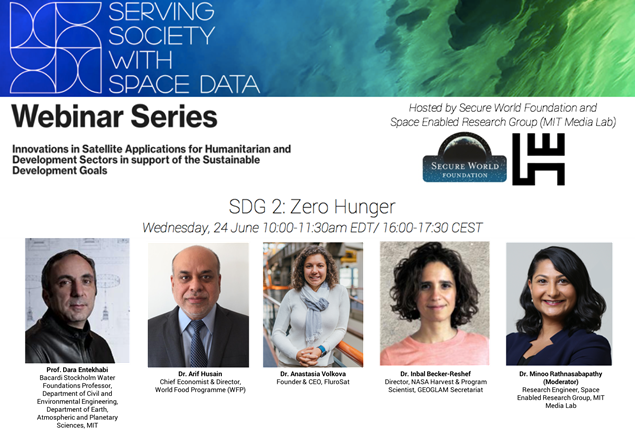Serving Society with Space Data: SDG 2 - Zero Hunger
When: Wednesday, June 24, 2020
Time: 10:00 AM - 11:30 AM EDT
Where: Virtual
Co-hosted by the Space Enabled research group and SWF, this virtual series, Serving Society with Space Data: Innovations in Satellite Applications for Humanitarian and Development Sectors in support of the SDGs, aims to engage a multi-sector audience in discussions on how space technologies and geospatial applications contribute to better outcomes in critical fields around the world, such as energy, food security, poverty, and governance. Held twice a month, the events will bring together stakeholders working in companies, nonprofits, academia, and government to highlight initiatives taken to progress toward the 17 Sustainable Development Goals (SDGs) using a truly transformative multi-stakeholder approach. The series will highlight real-world case studies as well as opportunities and challenges for expanding the use of satellite data in efforts to achieve the SDGs. This series seeks to look at ongoing work by a variety of actors, with a special focus on development and humanitarian projects.
Space Enabled and the Secure World Foundation invite participants to help us curate knowledge about the ways that leaders working in critical fields such as energy, poverty and food security are using satellite data to support their work. Each webinar will feature presentations by a group of topical experts, in-seminar data collection through live poll questions, and audience Q+A.
SDG 2: Zero Hunger | Video
The United Nations has set ending hunger, achieving food security and improved nutrition, and promoting sustainable agriculture as part of the 17 Sustainable Development Goals (SDGs). A rapidly growing global population, socio-economic development, limited production resources and changing climate, play a significant role in increasing the vulnerability of sustainable food systems around the world. Data derived from space technologies such as navigation, communication and remote sensing capabilities play a unique role in addressing food security challenges, and guiding policy makers on today's policies for future food security.
- Examples of real-world applications of space data to address food security around the world
- Demonstrate the role of space technology as an effective observation-based policy tool for monitoring food security, and increasing agricultural productivity and production
- Highlight potential technical barriers that limit the operational use of Earth Observation by decision makers
- Share pathways of collaboration and coordination between agencies and organizations working on food security



 Share
Share